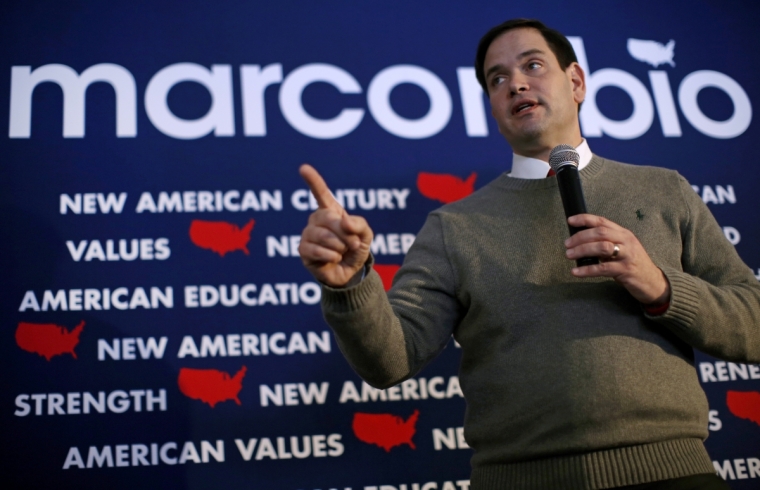Rubio talks religious liberty after atheist voter poses question

WAVERLY, Iowa (Christian Examiner) – Republican presidential candidate Marco Rubio doesn't want to push his faith on anyone, the candidate said in response to an inquiry from an atheist during a town hall meeting in Iowa Jan. 18.
During the meeting, Jason Scott, a member of the Wisconsin-based Freedom from Religion Foundation, a litigious anti-Christian organization, posed a question to Rubio about what his role in religious affairs would be if elected president.
Scott said Rubio's new campaign advertisement, which talks about his faith throughout the 30-second commercial, has raised concerns about the candidate's favoritism toward Christianity and his willingness to impose his views on others – such as atheists, which Scott described as "one of the fastest growing voting blocs."
Scott said he wanted to hear from candidates about how they would protect the rights of non-theists or atheists.
Rubio said all Americans have the right to believe whatever they want or nothing at all and to express their faiths in the public square. Politicians can't, however, he said, coerce anyone.
"I can't force you to be a Christian," Rubio said. "Christianity is a free gift and we Christians believe that salvation is a free gift that has to be willfully accepted. You can't force it on people. You have a right to believe in whatever you want. Now, I am going to share my faith, especially when I am asked. Because, my faith influences who I am and every aspect of my life."
Rubio also said he hopes people will understand that he can't form his political opinions without his faith influencing him, and that's what Americans should hope for in a president.
"You shouldn't be worried about my faith influencing me. In fact, I think you should hope my faith influences me and here's why. You know what my faith teaches me?" Rubio asked.
"My faith teaches me that I have an obligation to care for the less fortunate. My faith teaches me that I have an obligation to love my neighbor. My faith teaches me that I have an obligation for those who are hungry to help try to feed them; for those that are naked, to help clothe them. My faith teaches me that I have an obligation that I need to minister to those in prison. My faith teaches me that I have an obligation that if I want to serve Jesus that I have to serve."
Rubio then seemed to hit back at the current climate of political and religious discussion in America, in which he believes there is pressure on Christians to remain silent. He said America, if he is elected, will be a place "where no one is forced to violate their conscience."
That means, he said, "[N]o one is going to force you to believe in God. But, no one is going to force me to stop talking about God. I am not going to force you to pray. I am not going to force you to go to church. I am not going to force you to espouse beliefs that you don't have. But, no one is going to take away my right and your right to live out the teachings of your faith – no one."
Rubio did not say that America has always been a Christian nation, a frequent point of criticism for many candidates from the Freedom from Religion Foundation. He said, however, that Judeo-Christian values generally influenced the United States. To think otherwise proves "you don't know history," Rubio said.
"I am not saying you, I am just saying in general. This nation was founded on the principle that our rights come from our Creator. If there is no creator, then where did your rights come from? That's why it is important for us to understand that and we are going to protect the rights of Americans to continue to believe that."
Scott posted Rubio's comments on his YouTube channel under the title, "Marco Rubio: Pastor in Chief?" Opinions on Rubio's reply have been generally positive. Some, who claim to be atheists, also wrote comments indicating the answer was acceptable to them.